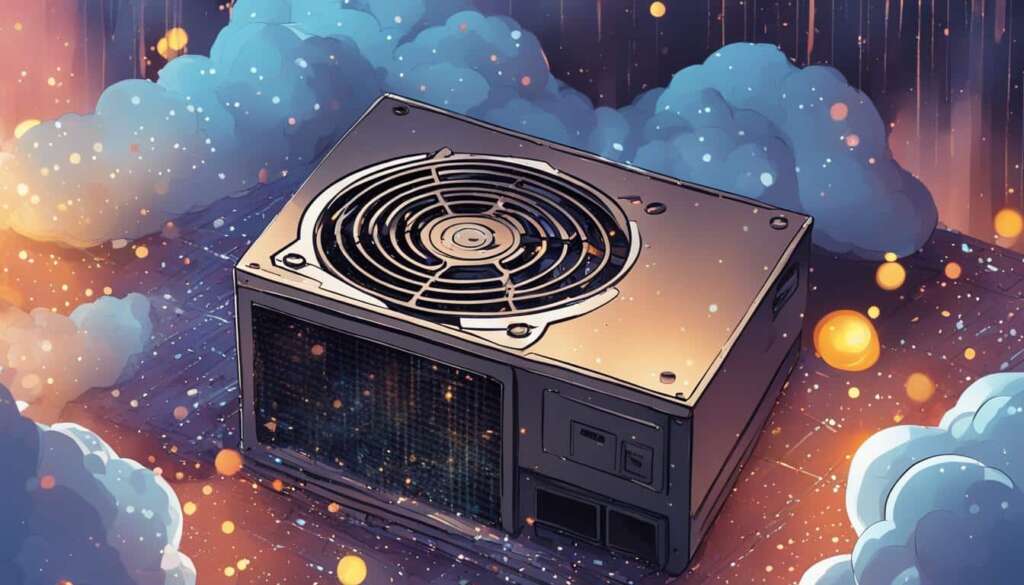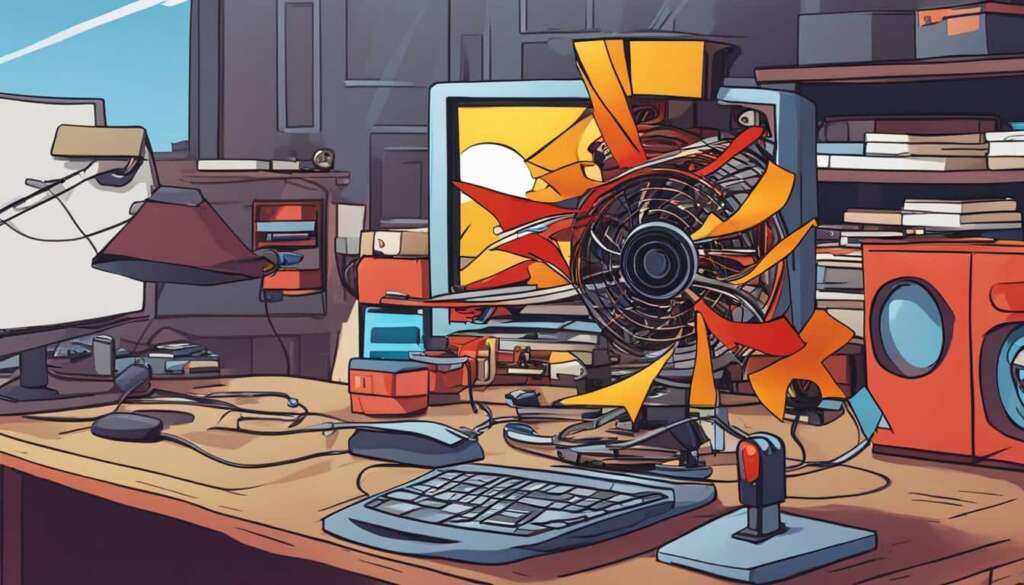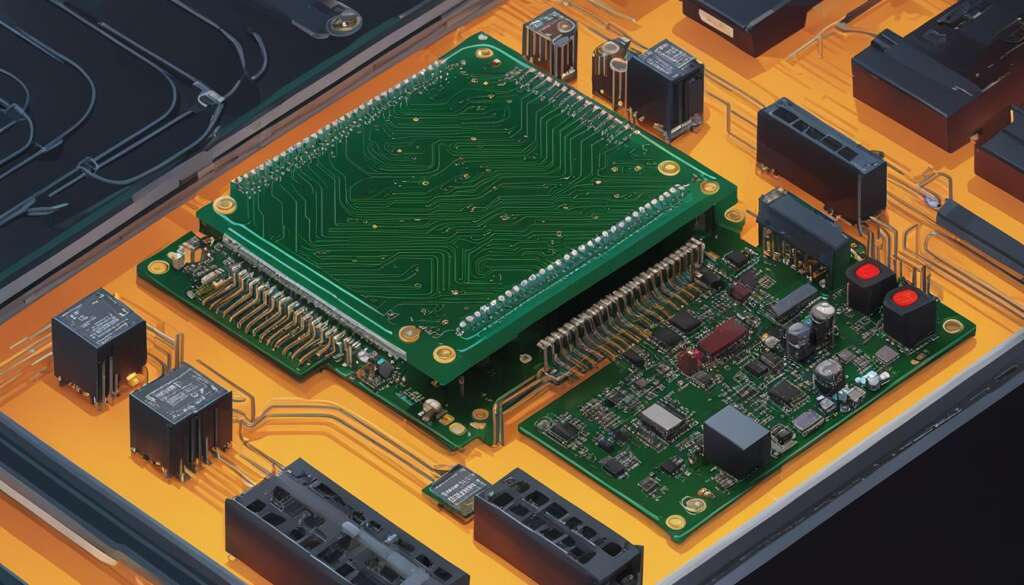Table of Contents
Is your PC making an annoyingly loud noise? Don’t worry, you’re not alone. Loud PC fans can be a common issue that many users experience. Understanding the causes behind the noise and finding effective solutions can help you restore peace and quiet to your computing experience.
There are several factors that can contribute to a loud PC fan. High internal temperatures, such as those caused by 100% disk usage or high RAM usage, can cause the fan to work harder to dissipate heat. Dust and dirt in the vents can impede airflow, forcing the fan to operate at a louder volume. Additionally, if your computer lacks proper airflow, the fan may have to work harder to cool down the components, resulting in increased noise levels.
While some fan noise is normal, persistent and excessive noise can indicate larger performance issues or hardware problems. It’s important to take steps to address these issues to improve the overall performance and longevity of your PC.
In the upcoming sections, we will explore in detail the reasons behind loud PC fans and provide you with practical tips and advanced solutions to silence your PC fan. So, stay tuned to discover the causes behind the noise and find the right solutions to make your PC whisper-quiet once again.
Reasons Behind Loud PC Fans
The loudness of your PC fan can be attributed to various reasons. High internal temperatures caused by 100% disk usage or high RAM usage can cause the fan to work harder to dissipate heat. Dust and dirt in the vents can also impede airflow, leading to increased fan noise. Additionally, a lack of proper airflow within the computer can result in the fan working harder to cool down the components. Identifying and addressing these issues can improve performance and extend the lifespan of your computer.
When your computer is under heavy load, such as when running resource-intensive applications or processes, the internal temperatures can rise significantly. This heat buildup puts a strain on the fan, forcing it to spin faster and generate louder noise in an attempt to cool down the system. Similarly, if your computer’s RAM usage is high, it can cause increased heat production, resulting in the fan kicking into overdrive.
Dust and dirt accumulation in the vents and fan blades can obstruct the airflow, making it harder for the fan to effectively cool down the components. As a result, the fan has to work harder, leading to increased noise levels. Regularly cleaning out the dust and ensuring proper airflow can alleviate this issue and reduce fan noise.
To prevent loud PC fans caused by a lack of airflow, it is important to ensure proper ventilation in your computer’s case. This includes keeping the vents unobstructed and providing enough space for the air to circulate. Additionally, check if there are any obstacles like cables or other components blocking the airflow and rearrange them if necessary.
By addressing these factors contributing to loud PC fans, you can create a more efficient and quieter computing experience. The next section will provide tips on how to quiet your PC fan and reduce the noise further.
Tips to Quiet Your PC Fan
Are you tired of the constant noise coming from your PC fan? Luckily, there are several steps you can take to make your PC fan quieter and restore some peace to your computing experience. By following these tips, you can minimize fan noise and enjoy a more serene working environment.
1. Close Background Apps
Background applications and processes can consume excessive resources, causing your PC fan to work harder and generate more noise. Take a moment to close any unnecessary apps running in the background and free up your system resources.
2. Run a Malware Scan
Malicious software can often go unnoticed and place a strain on your PC, leading to increased fan noise. Perform a thorough malware scan to ensure that your computer is free from any malicious programs that may be causing your fan to work harder than necessary.
3. Increase Airflow
Improving the airflow around your computer can help reduce the workload on your fan and minimize noise. Make sure that your computer’s vents are unobstructed and clean from dust and debris. Consider placing your computer in a well-ventilated area or using a cooling pad to increase airflow.
4. Turn Off Your Computer
Sometimes, all your computer needs is a fresh start. Turn off your computer for a few minutes to allow it to cool down. Then, turn it back on and observe if the fan noise has decreased. This simple step can help alleviate any performance issues that may be causing your fan to work harder.
5. Check Demanding Applications and Close Tabs
When your PC runs resource-heavy applications or has multiple tabs open, it can strain your system, resulting in increased fan noise. Take a moment to check for demanding applications and close any unnecessary tabs. This will give your PC a break and reduce fan noise.
6. Use Optimization Software
Optimization software can help clean up unnecessary files and fine-tune your computer’s performance, leading to reduced fan noise. Consider using reputable optimization software to streamline your system and enhance its efficiency.
7. Give It Space
Proper ventilation is crucial for maintaining a quiet PC fan. Ensure that your computer has enough space around it to allow for adequate airflow. Avoid placing your computer in enclosed spaces or crowded areas that can impede proper ventilation.
By following these tips, you can significantly reduce the noise generated by your PC fan. Enjoy a quieter computing experience and focus on your tasks without the distraction of a loud fan. Remember, a quiet PC fan leads to a more peaceful and productive work environment.
| Tip | Description |
|---|---|
| Close Background Apps | Shut down unnecessary background apps and processes that consume excessive resources. |
| Run a Malware Scan | Perform a thorough scan to eliminate any malware that may be overloading your PC. |
| Increase Airflow | Clear out dust and debris, and ensure unobstructed ventilation around your computer. |
| Turn Off Your Computer | Giving your computer a break can resolve minor performance issues that strain the fan. |
| Check Demanding Applications and Close Tabs | Identify resource-intensive apps and close unnecessary browser tabs. |
| Use Optimization Software | Utilize reputable optimization software to clean up your system and improve efficiency. |
| Give It Space | Ensure your computer has adequate space for proper ventilation. |
Implement these tips to enjoy a quieter PC fan and a more enjoyable computing experience. By reducing fan noise, you can focus better, increase productivity, and may even extend the lifespan of your computer.
Advanced Steps to Silence Your PC Fan
If the previous steps did not sufficiently quiet your PC fan, you can consider more advanced measures. Firstly, check and tighten any loose fans and attachments in your computer. Loose components can cause vibrations and contribute to increased fan noise. By ensuring everything is firmly secured, you can minimize unnecessary movement and reduce noise levels.
Cleaning the fans and vents is another crucial step. Over time, dust and debris can accumulate, obstructing airflow and causing the fan to work harder. Use compressed air and a soft brush to carefully remove any build-up from the fans and vents. This simple maintenance task can greatly improve cooling efficiency and help reduce noise.
If cleaning doesn’t solve the noise issue, it may be time to replace your fans. Consider upgrading to larger, more efficient fans that can generate adequate airflow at lower speeds, thus reducing noise levels. Additionally, replacing your traditional hard drive with a solid-state drive (SSD) can significantly decrease noise as SSDs have no moving parts and operate silently.
Furthermore, it’s essential to check for any loose components inside your computer that may be causing vibrations. Securely tighten any screws or fittings that may have become loose over time. Lastly, if you’re still struggling with excessive noise, you can explore the option of adding sound insulation to your computer case. However, ensure that the insulation does not obstruct proper airflow, as this can lead to overheating.
FAQ
Why is my PC so loud?
The loudness of your PC fan can be attributed to various reasons. High internal temperatures caused by 100% disk usage or high RAM usage can cause the fan to work harder to dissipate heat. Dust and dirt in the vents can also impede airflow, leading to increased fan noise. Additionally, a lack of proper airflow within the computer can result in the fan working harder to cool down the components. Identifying and addressing these issues can improve performance and extend the lifespan of your computer.
How can I make my PC fan quieter?
There are several steps you can take to make your PC fan quieter. Start by closing background apps and processes that may be consuming excessive resources. Run a malware scan to ensure that your computer is not infected with any malicious software that may be causing the fan to work harder. Increasing airflow around your computer’s vents and keeping them clean from dust and debris can also help reduce fan noise. Turning off your computer for a few minutes and then restarting it can sometimes help alleviate performance issues that may be causing the fan to work harder. Additionally, checking and closing demanding applications and tabs, using optimization software to clean up unnecessary files, and ensuring that your computer has enough space for proper ventilation can all contribute to a quieter PC fan.
What are some advanced steps to silence my PC fan?
If the previous steps did not sufficiently quiet your PC fan, you can consider more advanced measures. Check and tighten any loose fans and attachments in your computer. Clean the fans and vents using compressed air and a soft brush to remove dust and debris. If necessary, you can replace old fans with larger, more efficient ones. Upgrading your hard drive to a solid-state drive (SSD) can also reduce noise as SSDs have no moving parts. Check for any loose components in your computer that may be causing vibrations and tighten them as needed. Lastly, adding sound insulation to your computer can help dampen noise, but be cautious not to impede proper airflow and cause overheating.







